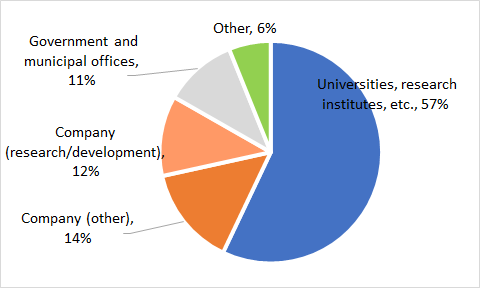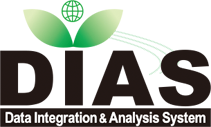2024.4.21
Report on DIAS User Survey 2024
We conducted a web survey of DIAS account holders in January and February 2024. We are very grateful for the many comments we received despite the inquiries in the free-text format.
DIAS is a research and development project with a primary goal to achieve research results and implement them in society. It is essential to the DIAS project that we continue our research and development based on your reports and requests, and your responses to the survey are precious to us as we move forward with the project. We consider your participation in the survey itself to be a contribution to the DIAS project. Thank you very much for your cooperation.
This survey was conducted in both Japanese and English. Five hundred seventy-three responses were received, 77% in Japanese and 23% in English. We are pleased to report the results of the survey.
Affiliation of DIAS account holders
About 60% belonged to research institutions (universities, research and development corporations, etc.), about 1/4 to private companies, and about 10% to public offices and local governments. The “Other” category includes NPOs, individuals, etc. The trend was similar to the results of the 2023 survey.

How did you hear about DIAS?
Respondents learned about DIAS through word of mouth, event introductions, and web searches.
What were your interests in registering with DIAS?
We found that respondents are interested in registering with DIAS for various reasons, including using a specific dataset, using in research or contract work, or environmental and climate change concerns.
The specific datasets that led respondents to register with DIAS included the JRA series, XRAIN, and d4PDF. Respondents indicated that they registered because of their interest in weather data, climate change data, and reanalysis data.
What is the purpose of using DIAS?
Respondents indicated that they use DIAS for various purposes, including downloading data, using it for specific research or projects, analyzing weather and climate data, and for educational purposes.
Regarding the scope of their research and academic purposes, respondents indicated that they use DIAS for climate change, weather impact, environmental and ecosystem research, disaster risk and disaster prevention research, climate modeling and analysis, etc.
Are there problems in research and work?
We received many responses regarding issues and needs related to data downloading from DIAS. Some respondents commented that the download speed was too slow, etc. Since many users download data from DIAS simultaneously, downloading can take a long time, or the connection can become unstable. DIAS does not control the download speed, and the service is provided on a best-effort basis. Please consider avoiding large downloads at once or changing the time of day.
We also received comments regarding the data format of the published data. DIAS publishes the files in the format the data providers provide them. We do not convert them to any specific data format. Please understand this.
In addition, downloading data is becoming increasingly difficult due to its amount. There is a growing demand for a data analysis function that can, for instance, convert the data format, etc. We are considering providing an environment for on-site data processing and analysis using JupyterLab. Please wait for a while for the framework for using this environment.
Meanwhile, we have received many comments regarding the DIAS analysis environment. The DIAS project is now accepting new joint research proposals using the DIAS analysis environment. If you have a new function you would like to be added, why don’t we develop it together through this joint research program? Please apply with your proposal. Please refer to this page (written in Japanese) for more information on the joint research program. Please note that for this joint research proposal, the representative must be a researcher/engineer affiliated with a domestic university, research institution, or private company (excluding foreign companies with branches in Japan).
Others
We have received many comments on various topics regarding the use of DIAS. We may ask you for an individual interview. We would greatly appreciate your cooperation.
We will respond to some of your comments and questions individually by e-mail. We will also enhance our FAQ page to provide clues to help resolve some of the questions we receive.
Frequently Asked Questions (FAQ): https://diasjp.net/en/about/faq/
We are discussing how to respond to each comment we receive to improve DIAS services.
We will continue to conduct surveys regularly and consider improvements to the system and other areas that reflect your wishes and opinions.
Thank you again for your continued support of DIAS.



